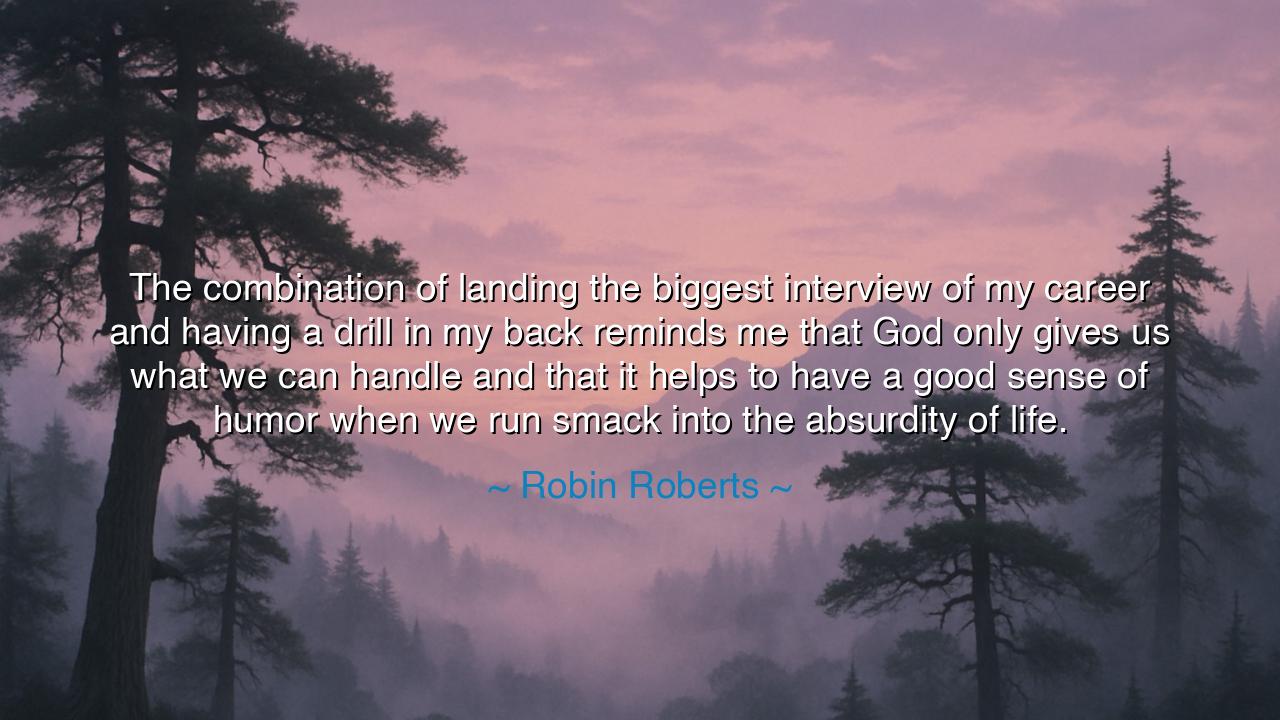
The combination of landing the biggest interview of my career and
The combination of landing the biggest interview of my career and having a drill in my back reminds me that God only gives us what we can handle and that it helps to have a good sense of humor when we run smack into the absurdity of life.






In the words of Robin Roberts, “The combination of landing the biggest interview of my career and having a drill in my back reminds me that God only gives us what we can handle and that it helps to have a good sense of humor when we run smack into the absurdity of life.”
Though spoken in the voice of a journalist, these words resound with the ancient wisdom of the human spirit — that faith and humor are twin pillars of endurance, holding us upright when the world tilts toward chaos. Roberts, a woman who faced both triumph and trial in her journey, reminds us that even amidst life’s contradictions — the moments when joy and pain arrive hand in hand — there is a deeper order at work. In those moments of absurdity, when the divine seems to test the limits of our strength, it is grace, and often laughter, that keep the soul from breaking.
To say that “God only gives us what we can handle” is to echo an age-old truth spoken in many tongues: that the human heart is forged in fire. The ancients believed that the gods tested those they loved, not to destroy them, but to refine them. Just as iron becomes steel only through heat and hammering, so does the spirit grow stronger through adversity. Roberts, in the midst of both career glory and physical pain, speaks from this place of refinement — a place where joy and struggle coexist, where faith is not a shield against hardship but the strength to bear it. In that moment, she recognizes that endurance is divine, but humor is human — and both are sacred.
The origin of such insight lies deep within the lineage of the wise. Consider the story of Job, the ancient sufferer of scripture. Stripped of wealth, health, and family, he questioned the heavens yet never surrendered his faith. When life became incomprehensible, when the absurdity of pain overwhelmed his reason, he discovered that surrender was not defeat, but transformation. Like Job, Roberts reminds us that life’s contradictions are not curses — they are crucibles. To face them with a sense of humor is not to mock the pain, but to rise above it, to claim dominion over the chaos that seeks to swallow us.
And there is deep truth in her mention of “the absurdity of life.” For existence is rarely neat or fair; it is a tapestry woven with both gold and shadow. The wise have always known this. The philosopher Epictetus, who lived as a slave, taught that while we cannot control what happens to us, we can control how we meet it. To laugh, even as we struggle, is the highest act of defiance against despair. It is the soul’s way of saying, “You may wound me, but you will not define me.” In Roberts’s reflection, this laughter is not foolishness — it is clarity, the light that flickers even in the darkest chambers of experience.
There is a story told of Winston Churchill, who during the most harrowing days of war, would light a cigar, pour a glass of brandy, and crack a joke as bombs fell upon London. When asked how he could laugh at such times, he said, “If we fail to laugh, we have already surrendered.” His humor did not deny the horror around him; it preserved his humanity within it. So too does Robin Roberts reveal that humor, anchored in faith, becomes an act of courage — a declaration that the spirit will not bow even when the body trembles.
Through her words, we are reminded that laughter and faith are not luxuries, but necessities. They are the breath and heartbeat of endurance. To laugh when life feels absurd is to reassert control over what cannot be controlled. It is to acknowledge pain, yet refuse to let it have the final word. This is not denial; it is wisdom — the same wisdom that the Stoics, prophets, and poets have whispered through the ages: that the soul must never lose its capacity for lightness, even when walking through the valley of shadow.
Let this, then, be the lesson of Robin Roberts’s wisdom: when life tests you, meet it with strength and humor. When triumph and trial arrive in the same breath, do not despair — smile at the absurdity of it all. For laughter, when born of faith, is not mockery but majesty. It transforms pain into perspective and struggle into story. Remember that the divine gives you not a life without burden, but a heart strong enough to carry it — and a spirit bright enough to laugh along the way.
And so, dear listener, hold fast to her truth: “God only gives us what we can handle, and it helps to have a good sense of humor.” When the absurd and the profound collide, do not shrink away. Stand tall, laugh softly, and move forward with courage. For in those moments, you are not merely surviving life’s absurdities — you are transcending them, radiant with the wisdom of one who has turned adversity into art and endurance into grace.






AAdministratorAdministrator
Welcome, honored guests. Please leave a comment, we will respond soon